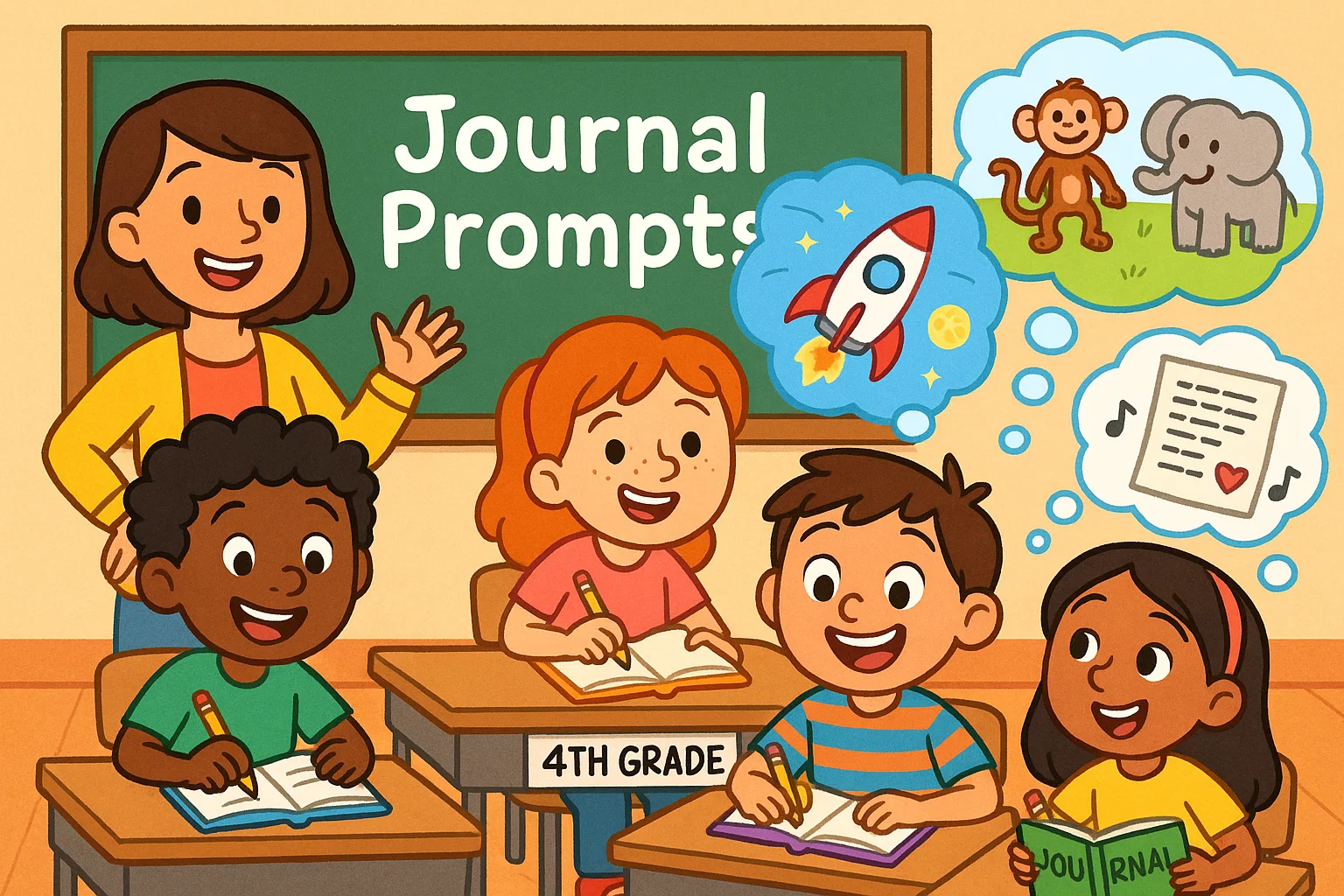Fourth grade is a pivotal stage when students move beyond the basics and begin using writing for deeper thought and self-expression. The right journal prompts can turn a blank page into an invitation for creativity, helping kids think critically, build confidence, and enjoy the writing process. This article explores the benefits of journaling and shares engaging 4th grade prompts to inspire young storytellers.
Benefits of 4th Grade Journal Prompts
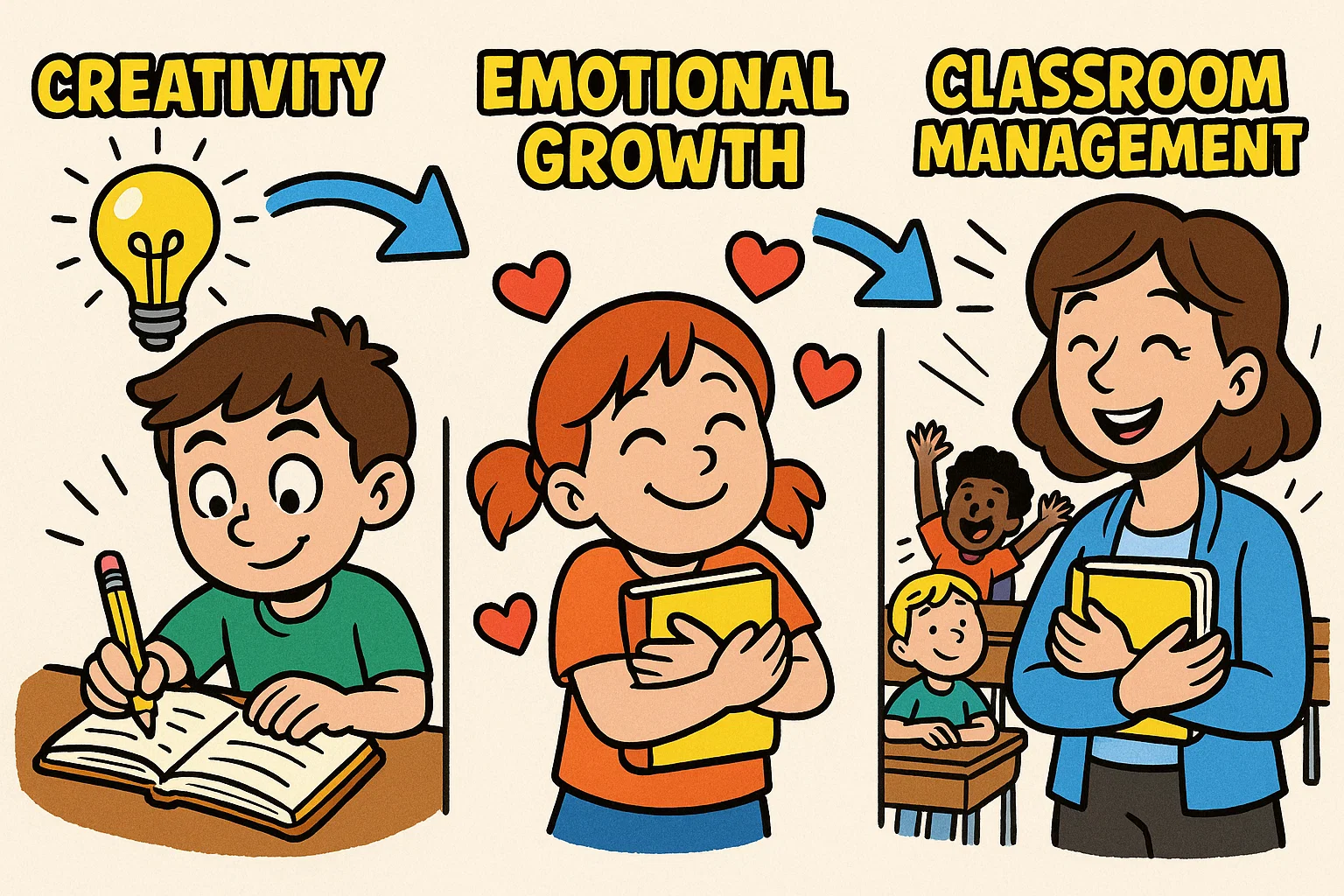
Journaling is far more than a simple academic exercise; it’s a foundational practice that supports the whole child—cognitively, emotionally, and academically. For 4th grade students, who are rapidly developing complex social and intellectual capacities, the consistent use of a 4th grade journal is a powerful tool for growth.
Cognitive and Academic Growth
Regular journal writing directly contributes to the strengthening of core academic abilities. When fourth graders use writing prompts, they are repeatedly practicing essential language arts skills in a low-stakes, engaging format.
- Enhance Writing Skills and Fluency: Consistent practice builds writing stamina. Studies show that regular, informal writing can lead to significant improvements in writing speed, word count, and overall coherence. When students aren’t worried about punctuation errors, they focus on getting their ideas clearly onto the page, which is the first step toward advanced composition.
- Develop Critical Thinking and Problem-Solving: Thought-provoking prompts that ask students to defend a position (opinion writing) or solve a hypothetical problem require them to apply logic and evidence. As a student works through a prompt, they are strengthening the prefrontal cortex functions associated with planning, organizing, and divergent thinking.
- Vocabulary and Descriptive Language: Prompts that encourage them to describe their favorite subject in detail (descriptive prompts) force students to seek out more precise and vivid vocabulary, which is then reinforced in their long-term memory.
- Connect Reading and Writing: Journaling can be used as a reading response tool, allowing students to deeply reflect on characters, themes, and plot points in the books they are reading. This makes the learning experience more integrated and meaningful.
| Academic Benefit | Corresponding Skill | Example Prompt Application |
| Fluency & Stamina | Word count, speed, coherence | Write for ten minutes straight without stopping. |
| Critical Thinking | Analysis, evidence, logic | If your school could only teach two subjects, which two should they be and why? (Opinion Writing) |
| Creative Writing | Imagination, plot, character development | A mad scientist accidentally turned your pencil into a talking banana. (Narrative Prompts) |
| Vocabulary | Descriptive language, word choice | Use all five senses to describe your favorite place to visit. |
Social and Emotional Development
The shift into fourth grade often involves navigating more complex social dynamics and a wider range of emotions. Journaling offers a crucial, private outlet for processing these changes, directly supporting a child’s emotional intelligence and self-awareness (Result 1.2, 1.4).
- Emotional Expression and Regulation: Journaling provides a non-judgmental space for a child to express feelings that they might not be able to verbalize easily. The act of writing down their feelings—happiness, sadness, frustration—helps them to organize and understand their emotions, leading to improved self-regulation and fewer emotional outbursts (Result 1.4).
- Self-Confidence and Reflection: Responding to personal journal prompts encourages children to reflect on their strengths, acknowledge their accomplishments, and practice positive self-affirmations. This self-exploration is a key component in nurturing a healthy self-esteem (Result 1.2, 1.6).
- Empathy and Perspective-Taking: Prompts that require them to write from another’s point of view or consider how a peer might be feeling can effectively cultivate empathy and kindness, which are critical for forming and maintaining deep interpersonal relationships (Result 1.2).
Classroom Management Tool
For educators, journal writing is an exceptional, often overlooked, strategy for maintaining a productive learning environment. A dedicated journal time provides a structured routine that aids in transitions and provides invaluable insight into student well-being.
- A Quiet Transition Starter: Beginning the day or a class period with a short, engaging prompt (5–10 minutes) is an effective way to help students settle down, focus their energy, and transition from one activity to the next with minimal disruption.
- Formative Assessment and Check-In: Dialogue journals or learning logs allow a teacher to gauge student comprehension of a topic or understand their emotional state discreetly. An entry like, “Write down the one thing from today’s science lesson that still confuses you,” serves as a quick, low-stakes checkpoint for understanding the material (Result 3.1).
- Fostering a Positive Writing Attitude: Since journaling is inherently non-threatening and low-stakes—often not corrected for grammar—it significantly reduces the writing anxiety that many elementary students experience, encouraging risk-taking and greater engagement (Result 3.3).
4th Grade Journal Prompts List
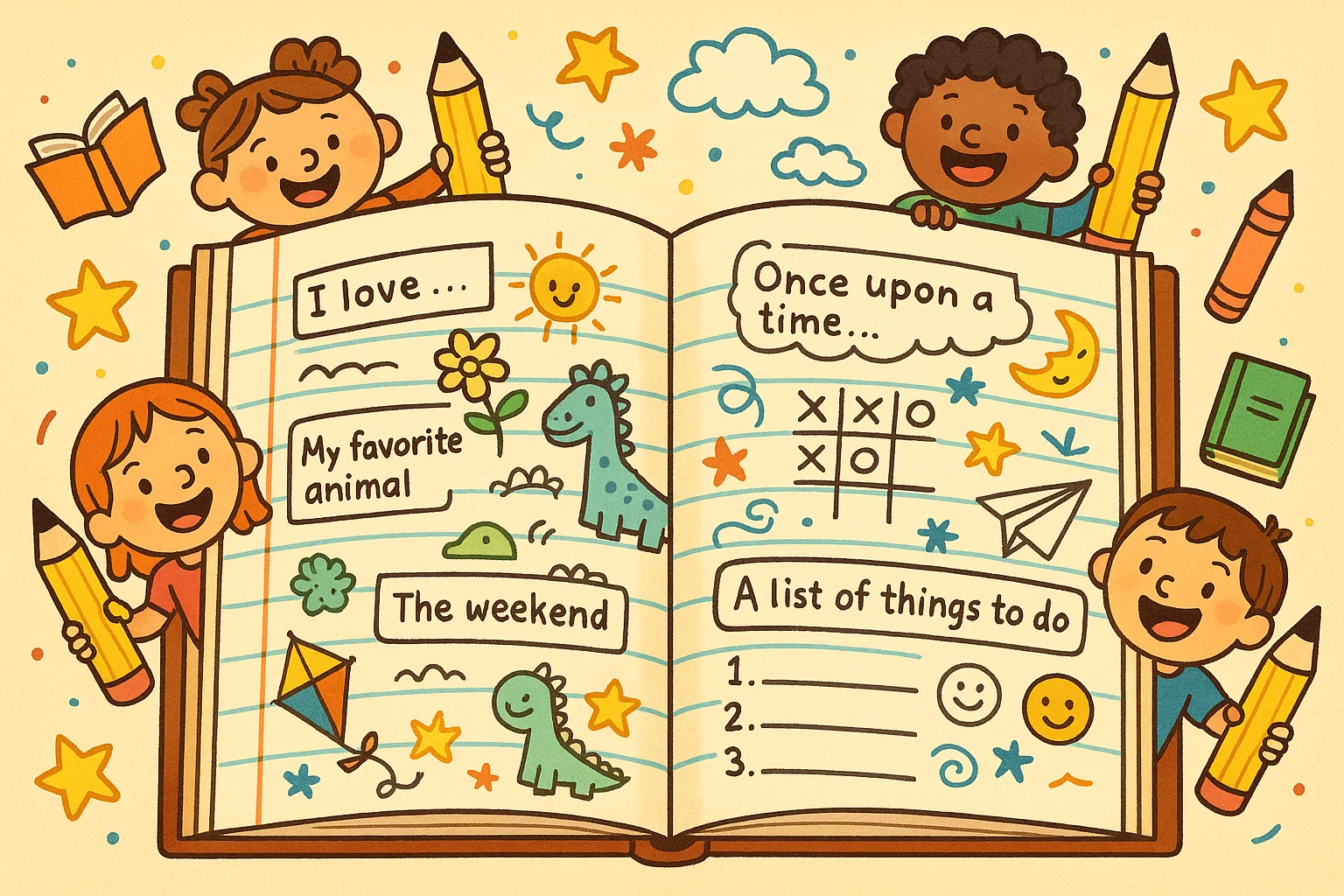
To truly engage students and foster their writing development, the prompts must be varied, exciting, and align with the intellectual curiosity of fourth graders. Writing prompts are a great way to introduce different genres and perspectives. Here is an extensive list of writing prompts for 4th grade to spark their imagination and build strong writing habits.
Journal Prompts About Self
These personal prompts for 4th graders encourage self-reflection, gratitude, and goal-setting. They help students articulate their inner world and foster a sense of identity.
- Write about a time when you surprised yourself by doing something you didn’t think you could do.
- What is one thing you are really good at? How did you get that skill, and what new thing can you try to nurture that talent?
- If you could create a new national holiday just for you, what would it be about and how would people celebrate it?
- Write a letter of gratitude to an object in your room. Why are you thankful for it?
- What are three short-term goals you want to achieve this month? What is the first step you need to take for each one?
Imagination and Creativity Prompts
Creative writing prompts are the perfect catalyst for developing a storyteller. These thought-provoking scenarios push young minds to think creatively.
- If you suddenly woke up and had a superpower, what would it be, and what is the very first thing you would do? (Be specific!)
- You discover a secret room in your house that can only be unlocked by singing a silly song. Describe your favorite thing inside the room.
- A tiny alien, no bigger than your thumb, landed in your backyard and needs your help to fix its spaceship. Write about a time you helped the alien.
- Imagine that all animals can talk. Which animal would you want to have a 30-minute conversation with and what would you talk about?
- What would it be like to live inside a giant pinball machine or a candy factory? Use all five senses to describe the experience.
Opinion Writing Prompts
Opinion writing prompts are essential for teaching students how to express their thoughts and opinions persuasively. They must take a stance and provide reasons for it.
- Should all schools require students to wear uniforms? State your thoughts and opinions and provide at least three strong reasons to support your claim.
- Which is better: reading a book or watching the movie adaptation? Argue your case.
- If you were in charge of the school lunch menu, what one item would you permanently add and what one item would you ban? Explain your choices using persuasive language.
- Do you believe it is better to be very kind or very smart? Why?
- Should all fourth graders be required to learn how to code? Why or why not?
Descriptive and Sensory Prompts
These journal writing prompts focus on using rich, descriptive language to paint a picture with words, a crucial skill for all successful language arts students.
- Describe your favorite place to read. Focus on the sounds, smells, and sights in that space.
- Write a detailed description of what a cloud might taste, feel, and sound like.
- Pretend your pet (or an imaginary pet) is writing a secret diary. Write about a time that you did something embarrassing from their point of view, using sensory details.
- If the color blue had a smell, what would it be? Describe your favorite shade of blue in detail.
- Use these writing prompts to describe a rainstorm outside your window—from the first drop to the moment the sun breaks through.
Emotion and Mindfulness Prompts
These are excellent journal prompts for kids to help 4th graders develop emotional literacy and mindfulness.
- Write about a time you felt deeply understood by someone. How did that experience impact you?
- What is one thing that helps you calm down when you feel angry or frustrated? Walk through the steps of your calming process.
- What are three things you are grateful for right now, and why do they matter to you?
- Write about a time you had to be resilient or bounce back from a difficult situation. What did you learn about your own strength?
- If your emotions were weather, what kind of weather would you be today, and why?
Community and World Prompts
Cross-curricular prompts broaden the student’s perspective beyond the self, encouraging them to think deeply about their role in the world.
- What is one thing you think your school or local community could do to be more kind?
- Imagine you have been put in charge of planning the best field trip ever. Where would you go and what would you do?
- If you could solve one global problem (like pollution or hunger), which one would you choose and what is your plan for fixing it?
- Write about a time you witnessed someone showing great kindness to a stranger.
- Design a new invention that would help students learn better. Draw and describe your favorite features.
Narrative Prompts
These short narrative writing prompts provide a clear starting point for a creative story, allowing young students to focus on developing plot, character, and setting.
- The library book you checked out last week has started whispering secrets to you.
- You found an old, crumpled treasure map tucked inside your cereal box this morning.
- Everyone in your town suddenly woke up one day with a talent for singing, except for you.
- A talking mad scientist mouse challenges you to a cheese-tasting duel.
- The new substitute teacher is secretly an intergalactic spy on a very important mission.
Story Starters for 4th Graders
Some of the most engaging writing ideas are simple sentences that drop the fourth-grade writer right into the action. These are excellent story starters that immediately activate the imagination and stimulate creative writing.
Adventure Story Starters
- “The old compass didn’t point north; it pointed toward the nearest magic.”
- “Beneath the loose floorboard, I found a leather-bound diary that was hundreds of years old.”
- “I knew the moment I stepped into the swirling green mist that this was not my town anymore.”
- “Our dog, Sparky, dug up something enormous and shiny in the backyard.”
- “A map to the secret waterfall was hidden on the back of the school cafeteria menu.”
Funny Story Starters
- “It was a day that started normally, until my chair started demanding I feed it mashed potatoes.”
- “My new favorite hat can read my mind and constantly shouts my embarrassing secrets.”
- “The first time I tried to bake, I accidentally created a batch of cookies that bounced.”
- “Grandpa’s teeth ran away during the night, and they left a tiny ransom note.”
- “I tried to convince the class pet, a hamster named Fuzzy, that I was a famous movie star.”
Mystery Story Starters
- “The school bell rang exactly seven minutes late, but all the clocks in the building were running perfectly on time.”
- “Someone was leaving a different, baffling riddle on my locker every morning.”
- “The secret to making our ancient water fountain taste like strawberry soda was finally revealed.”
- “I saw a shadowy figure climb into the old, abandoned treehouse, but no one ever goes there.”
- “The only thing left on the museum pedestal was a single, sparkling rubber duck.”
4th Grade Prompts by Writing Type
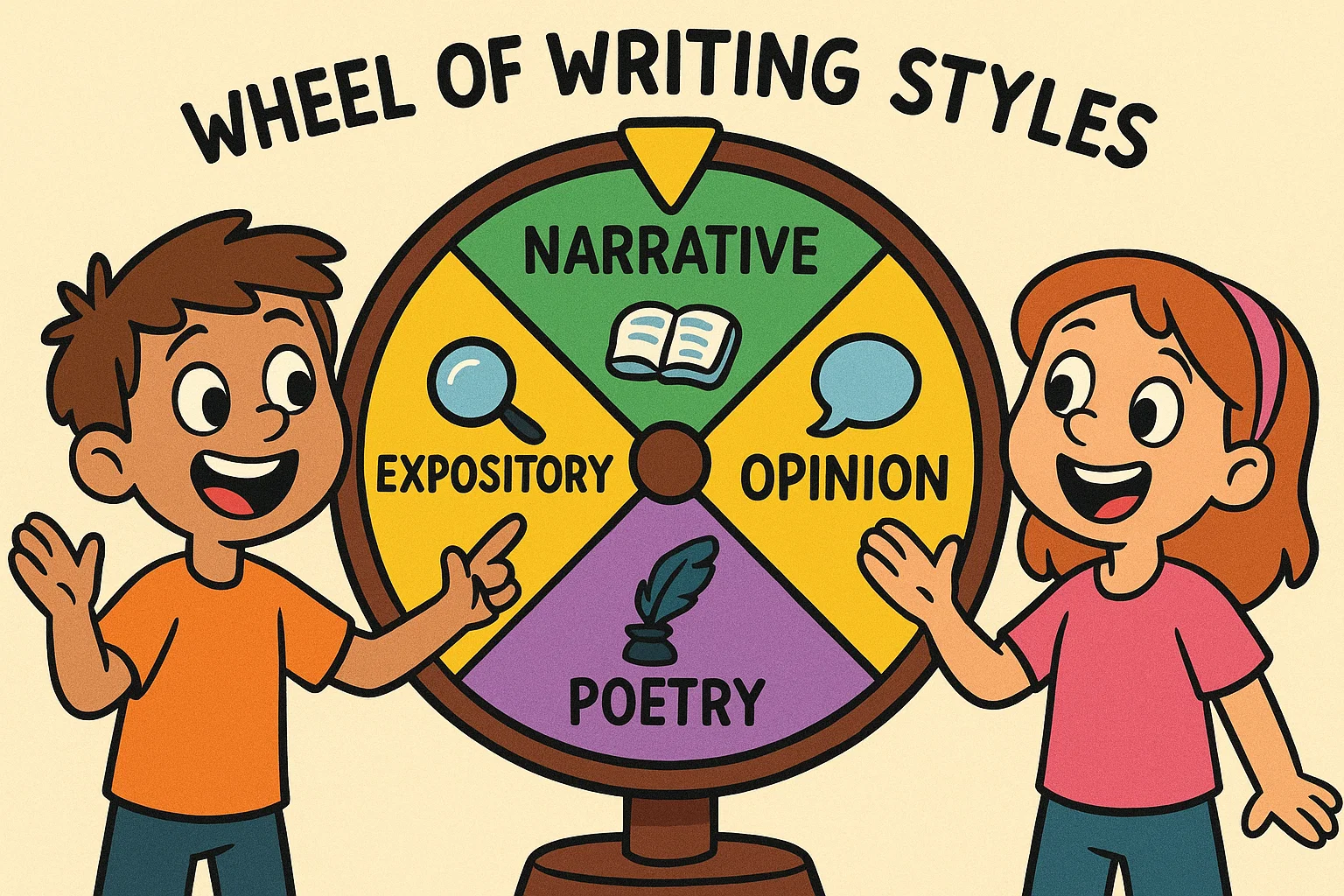
To ensure well-rounded writing development, prompts should be tied to the different modes of writing that 4th-grade students are expected to master. This categorical approach makes it easy for teachers to align the writing prompts with their current lesson plans in language arts.
Narrative Prompts
These creative writing prompts focus on the elements of a story: plot, character, setting, and theme. Students will not only enhance their imagination but also their structural understanding of fiction.
- Create a brand-new, fictional sport. Write a news report detailing the biggest game of the season, including a memorable, high-stakes moment.
- Your shoes suddenly gain the ability to transport you anywhere you want to go. Write about a time you traveled to a place you’ve always dreamed of.
- An ordinary marble rolls under your bed, but when you pick it up, it shows you a memory from one hundred years ago. Tell the story of that memory.
Expository Prompts
Expository, or informative, writing requires students to explain a topic clearly. These writing topics help them practice organizing information and presenting ideas clearly.
- Explain, step-by-step, how to make your favorite sandwich or snack. Pretend your reader has never seen or made it before.
- Research and explain the life cycle of a butterfly, a frog, or a favorite animal.
- Describe the three most important rules for being a good friend and explain why each rule is essential to a healthy friendship.
Opinion Prompts
Opinion writing prompts build persuasive writing skills by asking students to take a stance on a topic and then provide concrete evidence to back their claim.
- Should fourth graders have homework every night? Share your ideas and use evidence from your own experience to convince your reader.
- Which is the superior form of transportation: trains, cars, or airplanes? Defend your choice.
- If you were given $100 to donate to a charity, what kind of charity would you choose (animal, environment, people, etc.) and why is it the most important cause?
Poetry Prompts
Poetry writing allows students to experiment with language, rhythm, and imagery without the constraints of traditional paragraph structure, further enhancing their overall writing skills.
- Write an acrostic poem using the letters of your full name.
- Write a sensory poem about the feeling of walking on the beach or playing in the snow. Use powerful verbs and adjectives.
- Create a “Found Poem” by taking five interesting phrases or sentences from your favorite book and arranging them in a new way.
Seasonal and Themed Journal Prompts
Themed prompts are an excellent way to connect journaling to the time of year or specific classroom themes, ensuring the topics remain engaging for elementary students.
Fall Prompts
- Describe your favorite fall tradition. What makes it special?
- If you could talk to a squirrel preparing for winter, what advice would you give it?
- Write about a time you felt cozy and warm on a cold, rainy day.
Winter Prompts
- Imagine you build a snowman that comes to life. What is the first adventure you go on together?
- What is the best way to spend a snow day? Argue your case persuasively.
- Write about a time you gave a gift that was not a toy, and why it was meaningful.
Spring Prompts
- If you were a flower, what kind would you be and where would you be planted?
- Use these writing prompts to describe what your school grounds look, smell, and sound like as spring arrives.
- Write about a time you helped the environment in a small way.
Summer Prompts
- If you could travel anywhere in the world for a summer vacation, where would you go, and who would you take?
- Describe your favorite summer night memory.
- Write about a time you overcame a fear while trying a new summer activity.
Tips for Using Journal Prompts in 4th Grade
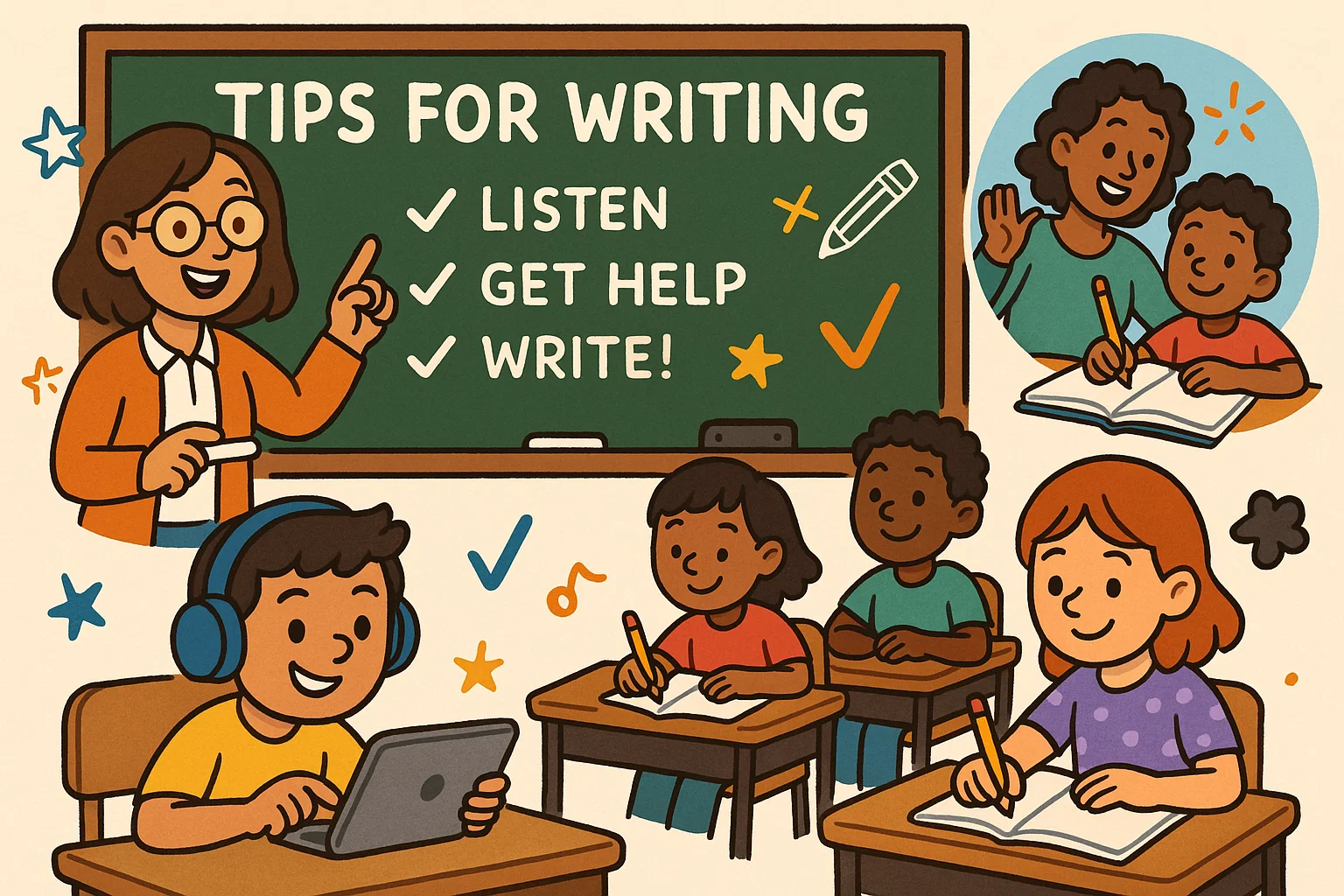
Whether you are a parent or a teacher, implementing a successful journaling routine requires clear structure and consistent encouragement. The goal is to build long-term writing habits and foster a positive writing journey.
Classroom Strategies
For teachers, consistency and clear expectations are the keys to successful journal writing in the classroom.
- Establish a Routine: Dedicate a specific, non-negotiable time each day (e.g., the first 10 minutes of language arts or immediately after lunch) for silent journal writing. This builds writing stamina.
- The “No-Grade” Rule: Emphasize that the journal is a “safe space.” For most entries, students should be graded on completion and effort, not on grammar or spelling. This low-stakes approach encourages them to take risks and focus on ideas clearly (Result 3.3).
- Varied Response Formats: Don’t limit students to just writing. Allow them to use drawings, collages, or mind maps in their journal to respond to a prompt.
- Dialogue Journals: Use the journal as a communication tool. Respond to select student entries with a thoughtful, non-judgmental note or question. This provides authentic one-on-one connection and valuable insight (Result 3.1).
Home Writing Practice
Parents are crucial partners in reinforcing strong writing habits in fourth graders.
- Provide the Right Tools: A special notebook, colorful pens, or stickers can make the journaling process feel like a fun, personal activity rather than an assignment. Encourage them to personalize their 4th grade journal (Result 1.5).
- Model the Behavior: Start your own journaling practice alongside your child. Seeing you write about your day or responding to a prompt shows them that it is a valuable activity for adults, too.
- Focus on Discussion: Instead of reading their private journal (unless they share it), use the prompt as a conversation starter. “I saw you write about a time you felt brave today—tell me more about that experience.”
Digital Tools
While the tactile experience of a paper journal is beneficial for handwriting and memory, digital tools can also be engaging for 4th-grade students.
- Blogging Platforms: Creating a private class blog where students respond to a prompt can foster a sense of audience.
- Interactive Prompts: Use online worksheet or app generators to randomly select a prompt, which can add an element of novelty and fun.


